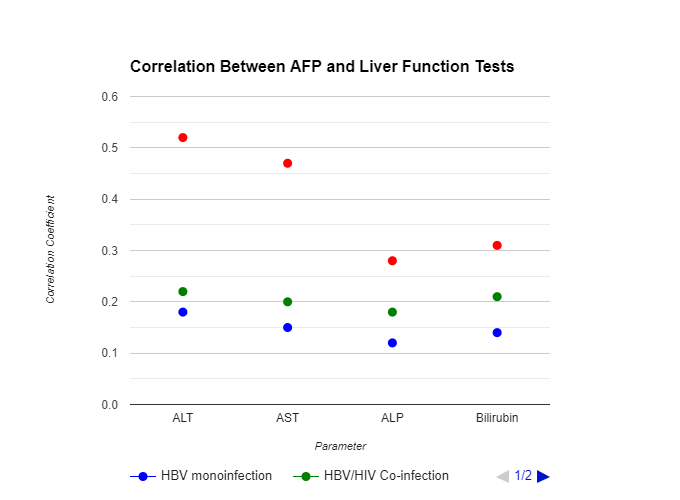Alpha-fetoprotein as a predictor of liver disease progression in HBV patients with HIV and HCV co-infections
Keywords:
Alpha-fetoprotein (AFP), Hepatitis B virus (HBV), Hepatitis C virus (HCV), Liver function tests, , Hepatocellular carcinoma, Co-infectionAbstract
Introduction: Hepatitis B virus (HBV) infection is a significant health challenge globally, especially in sub-Saharan Africa. Co-infections with HIV and HCV worsen HBV-related liver diseases, complicating clinical management. Alpha-fetoprotein (AFP) is a key biomarker for monitoring liver disease progression and detecting hepatocellular carcinoma (HCC). This study evaluates AFP levels in HBsAg and HBeAg seropositive patients with and without HIV and HCV co-infections over one year in Warri, Delta State, Nigeria. This study aimed to understand the impact of HIV and HCV co-infections on liver disease prognosis in HBV patients by evaluating AFP levels and liver function over one year.
Materials and Methods: This longitudinal cohort study included 200 HBsAg and HBeAg seropositive patients aged 18-65 years, divided into three groups: HBV monoinfection (n=80), HBV/HIV co-infection (n=60), and HBV/HCV co-infection (n=60). Participants were followed for one year with quarterly blood sample collections for AFP measurement using ELISA, liver function tests (ALT, AST, ALP, bilirubin), and viral load assessments. Sociodemographic data were also collected. Results: AFP levels were significantly higher in the HBV/HCV co-infection group (36.2 ± 12.4 ng/mL) compared to the HBV monoinfection (12.5 ± 4.3 ng/mL) and HBV/HIV co-infection groups (18.7 ± 6.8 ng/mL) (p<0.001). Elevated liver function tests, particularly ALT and AST, were more prevalent in the HBV/HCV co-infection group. AFP levels positively correlated with ALT (r=0.52, p<0.01) and AST (r=0.47, p<0.01) in the HBV/HCV co-infection group.
Conclusion: The higher AFP levels in HBV/HCV co-infected patients indicate an increased risk of liver disease progression and HCC. The positive correlations between AFP and liver enzymes suggest ongoing liver damage and regeneration in this group. These findings underscore the importance of routine AFP and liver function tests in the early detection and treatment of liver disease among HBV patients, particularly those with HCV co-infection, to enhance clinical outcomes.

Additional Files
Published
How to Cite
License
Copyright (c) 2024 Mathew Folaranmi Olaniyan, Kemi Felicia Ajiboye, Ogbeche Richard Ochagu, Tolulope Busayo Olaniyan, Taiwo Medinat Adeniran, Adelani Wakili Tijani, Phoebe Nwamaka Kanikwu, Obataze Josephine Apoyovwere, Odekunle Bola Odegbemi

This work is licensed under a Creative Commons Attribution-NonCommercial 4.0 International License.
